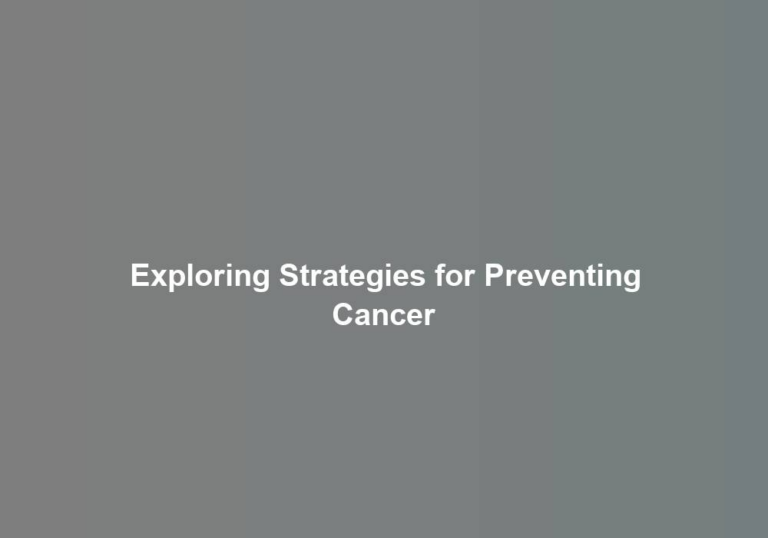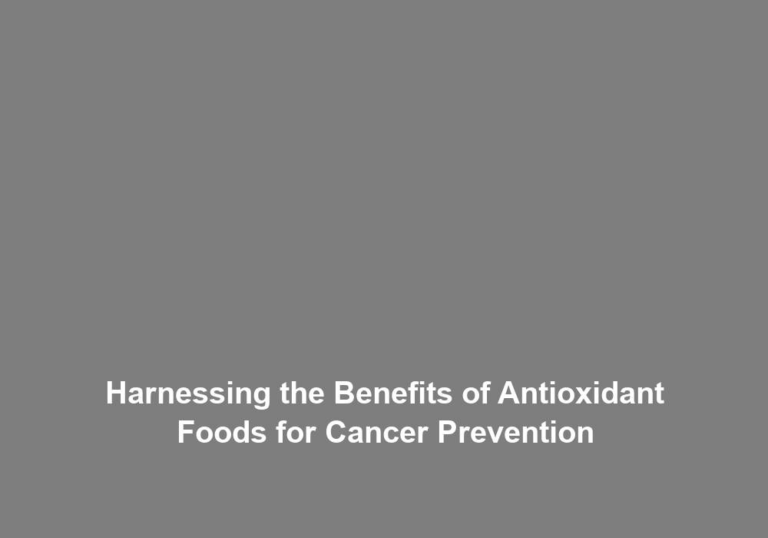Exploring Antioxidant Foods to Safeguard Against Cancer
When it comes to protecting your body from cancer, think of antioxidants as your personal army, ready to combat the harmful effects of free radicals. But which foods hold the key to this protective power? As you navigate through the world of antioxidant-rich foods, youG??ll discover a treasure trove of options that not only tantalize your taste buds but also offer potential protection against cancer. So, where should you begin your quest for these cancer-fighting superheroes?
Understanding Antioxidants and Cancer
To understand the relationship between antioxidants and cancer, it is essential to delve into the role of oxidative stress in the development of cancer cells. Oxidative stress occurs when there is an imbalance of free radicals and antioxidants in the body. Free radicals, which are byproducts of normal bodily processes, can damage cells and lead to various diseases, including cancer. This is where antioxidants come into play. Antioxidants are substances that can neutralize free radicals, reducing their harmful effects and preventing cell damage.
The importance of antioxidants in cancer prevention cannot be overstated. Research has shown that antioxidants help protect the body from the damaging effects of oxidative stress, thereby reducing the risk of developing cancer. By scavenging free radicals, antioxidants help maintain the integrity of cells and prevent mutations that can lead to cancerous growth. Additionally, antioxidants have been found to have anti-inflammatory effects, which can further contribute to cancer prevention.
Including a variety of antioxidant-rich foods in your diet is a practical and effective way to safeguard against cancer. Fruits such as berries, oranges, and grapes, as well as vegetables like spinach, kale, and bell peppers, are excellent sources of antioxidants. Nuts, seeds, and whole grains also provide a wealth of antioxidant compounds. By incorporating these foods into your meals, you can support your bodyG??s natural defense mechanisms against cancer and promote overall health and well-being.
The Link Between Free Radicals and Cancer
The role of oxidative stress in the development of cancer cells underscores the critical link between free radicals and the initiation and progression of cancer. Understanding this link is crucial in taking proactive steps to safeguard your health. Here are a few key points to consider:
-
Free Radicals and Cancer Risk: Free radicals, unstable molecules produced as a byproduct of normal body processes, can cause damage to cells and their DNA. This damage can contribute to the development of cancer. ItG??s important to be mindful of the sources of free radicals in your environment, such as cigarette smoke, air pollution, and certain chemicals, and take steps to minimize exposure.
-
Oxidative Stress and Prevention: Oxidative stress, which occurs when there is an imbalance between free radicals and the bodyG??s ability to neutralize them, plays a significant role in the development of cancer. Consuming a diet rich in antioxidants, such as fruits, vegetables, and nuts, can help counteract the effects of oxidative stress and reduce the risk of cancer.
-
Defense Against Free Radicals: Your body has its own defense mechanisms against free radicals, including enzymes and antioxidants. However, supporting these natural defenses through a healthy lifestyle, regular exercise, and a balanced diet can further enhance your bodyG??s ability to combat the harmful effects of free radicals and reduce the risk of cancer.
Top Antioxidant-Rich Foods to Include
For a diet rich in antioxidants, incorporating a variety of vibrant fruits and vegetables, such as berries, kale, and bell peppers, can be highly beneficial for safeguarding against cancer. These foods are packed with essential vitamins, minerals, and powerful antioxidants like vitamin C, vitamin E, and beta-carotene, which help neutralize free radicals in the body. HereG??s a practical guide to the top antioxidant-rich foods to include in your diet:
| Antioxidant-Rich Foods | Benefits |
|---|---|
| Berries (e.g., blueberries, strawberries) | Rich in anthocyanins, quercetin, and vitamin C, which may help reduce the risk of cancer and inflammation. |
| Kale | High in vitamins A, C, and K, as well as antioxidants lutein and zeaxanthin, offering potential anti-cancer properties. |
| Bell Peppers | Excellent source of vitamin C, beta-carotene, and other antioxidants that may aid in cancer prevention. |
| Nuts and Seeds | Provide antioxidant compounds like resveratrol, ellagic acid, and selenium, which have been linked to cancer risk reduction. |
In addition to these foods, consider incorporating antioxidant smoothie recipes into your routine. A blend of spinach, berries, and a splash of green tea can create a delicious and antioxidant-packed smoothie. Furthermore, having antioxidant-rich snacks such as mixed nuts, dark chocolate, or sliced bell peppers with hummus can be a satisfying way to increase your daily antioxidant intake. By including these top antioxidant-rich foods and snacks in your diet, you can actively support your bodyG??s defense against cancer.
Cooking Tips to Preserve Antioxidants
When cooking antioxidant-rich foods, itG??s important to use optimal cooking methods to preserve their nutrient content. For example, steaming, microwaving, and quick stir-frying are better options than boiling or long-duration cooking. Additionally, pairing antioxidant-rich foods with sources of healthy fats can help maximize the absorption of antioxidants in your body.
Optimal Cooking Methods
To maximize the retention of antioxidants in your food, consider using gentle cooking methods such as steaming, microwaving, or saut+?ing with minimal oil. These techniques help preserve nutrients and prevent the breakdown of antioxidants, ensuring their maximum absorption by your body. Here are some practical cooking tips to safeguard the antioxidant content in your meals:
- Steaming: Retains the highest amount of antioxidants compared to other cooking methods.
- Microwaving: Helps in preserving antioxidant levels due to shorter cooking times and minimal use of water.
- Saut+?ing with minimal oil: Allows for quick cooking at lower temperatures, helping to maintain the antioxidant content in vegetables and fruits.
Incorporating these cooking methods into your meal preparation can help ensure that you are maximizing the intake of valuable antioxidants to support your overall health.
Retaining Nutrient Content
To safeguard the antioxidant content in your meals, you can employ specific cooking techniques that help retain the nutrient content of your food, enhancing its overall health benefits. When it comes to preserving nutrients during food preparation, itG??s important to minimize the use of water and heat. Opt for methods such as steaming, stir-frying, or microwaving, as these techniques help to preserve the antioxidant content in vegetables. Additionally, itG??s crucial to avoid overcooking, as prolonged cooking times can lead to nutrient loss. Keep in mind that cutting your produce into larger pieces and cooking them whole can also help retain more nutrients. By being mindful of these cooking tips, you can ensure that your meals are not only delicious but also packed with the essential nutrients needed to safeguard against cancer and promote overall well-being.
Maximizing Antioxidant Absorption
You can optimize the absorption of antioxidants in your meals by utilizing specific cooking methods that preserve the antioxidant content of your food, thus maximizing its health benefits. To enhance absorption, consider the following cooking tips:
- Steaming and boiling: These methods help retain the antioxidant content of vegetables, such as broccoli and spinach.
- Using acidic marinades: Marinating meat, fish, or poultry in acidic mixtures like lemon juice and vinegar before cooking can reduce the formation of harmful compounds while increasing antioxidant absorption.
- Pairing foods strategically: Consuming foods high in fat-soluble antioxidants, like vitamin E and beta-carotene, with healthy fats can improve absorption. For example, drizzling olive oil over a salad containing spinach and carrots can enhance the absorption of their antioxidants.
Antioxidant Supplements: Do They Help?
Wondering if antioxidant supplements are worth adding to your regimen? LetG??s explore their efficacy and potential risks. Understanding the benefits and drawbacks of antioxidant supplements can help you make informed choices about your health.
Supplement Efficacy
Antioxidant supplements have been a topic of debate regarding their efficacy in preventing cancer. When considering whether to use antioxidant supplements, itG??s essential to be aware of supplement regulation, effectiveness, and consumer safety. Here are some key points to keep in mind:
- Supplement Regulation: Look for supplements that have been tested and approved by regulatory bodies to ensure their quality and safety.
- Effectiveness: While some studies suggest potential benefits, more research is needed to fully understand the effectiveness of antioxidant supplements in preventing cancer.
- Consumer Awareness and Safety: Be informed about the potential interactions with medications and other supplements, and consult with a healthcare professional before starting any new supplement regimen.
Being mindful of supplement regulation, effectiveness, and consumer safety can help you make informed decisions when considering antioxidant supplements for cancer prevention.
Potential Risks
Considering the potential risks associated with antioxidant supplements, it is crucial to carefully evaluate their impact on cancer prevention. While antioxidants are generally beneficial when obtained from natural food sources, the same cannot be said for supplements. Research suggests that high-dose antioxidant supplements may have long-term effects that are not entirely understood. Some studies have indicated that excessive intake of certain antioxidants, such as beta-carotene or vitamin E, could potentially promote, rather than prevent, the development of certain cancers. Additionally, antioxidant supplements may interact with medications or interfere with medical treatments. ItG??s important to consult with a healthcare professional before starting any supplement regimen, especially if you are undergoing cancer treatment. Opting for a balanced diet rich in antioxidant foods remains the safest and most effective approach to safeguard against cancer.
Incorporating Antioxidants Into Daily Meals
Looking to enhance your daily meals with powerful antioxidants to boost your health and protect against cancer? Here are some practical ways to incorporate antioxidants into your daily meals:
-
Antioxidant Smoothie Recipes
-
Start your day with a nutrient-packed antioxidant smoothie. Blend together a variety of berries, such as blueberries, strawberries, and raspberries, which are rich in cancer-fighting antioxidants like vitamin C and flavonoids. Add spinach or kale for an extra dose of antioxidants, along with some Greek yogurt and a splash of almond milk for a creamy, satisfying texture.
-
Meal Planning
-
Incorporate antioxidant-rich foods into your meal planning. Plan your meals around colorful fruits and vegetables, such as spinach, kale, broccoli, bell peppers, and tomatoes, which are high in antioxidants like vitamins A, C, and E. Opt for whole grains like quinoa, brown rice, and oats, as they contain selenium and other antioxidants that support overall health and reduce cancer risk.
-
Herbs and Spices
-
Enhance the antioxidant content of your meals with herbs and spices. Add flavorful antioxidants like turmeric, cinnamon, oregano, and ginger to your dishes. These spices not only elevate the taste of your meals but also provide potent antioxidants that can help protect your cells from damage.
Incorporating these antioxidant-rich foods into your daily meals can provide a delicious and effective way to safeguard against cancer and support overall health.
Conclusion
So, while thereG??s no concrete evidence that antioxidant supplements can prevent cancer, you can still enjoy a delicious array of antioxidant-rich foods to potentially protect yourself against the disease. Who knew that indulging in colorful fruits, vegetables, nuts, and seeds could be your secret weapon against cancer? Keep exploring and experimenting with these powerful foods to safeguard your health in the most ironic and enjoyable way possible.







